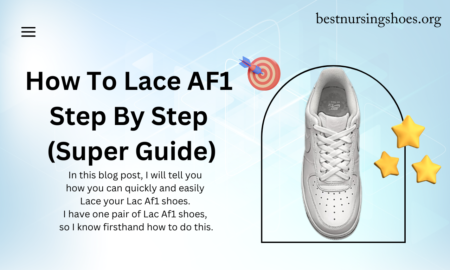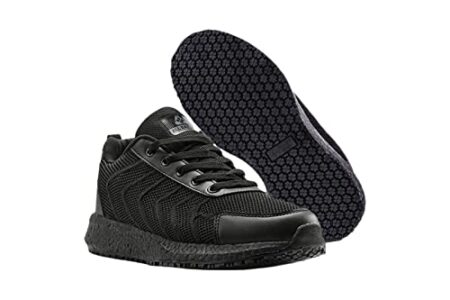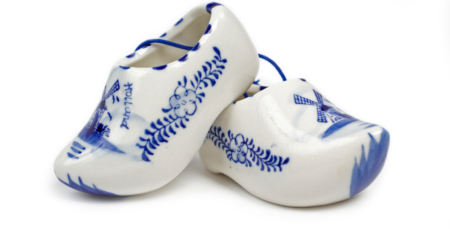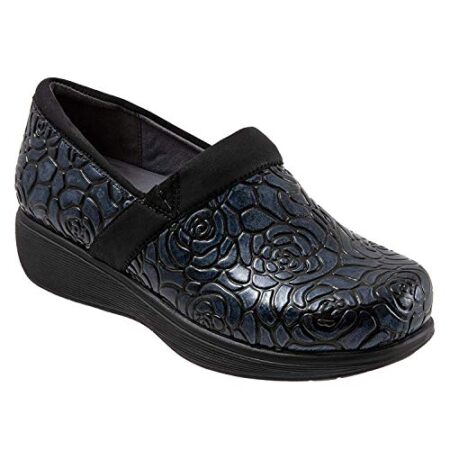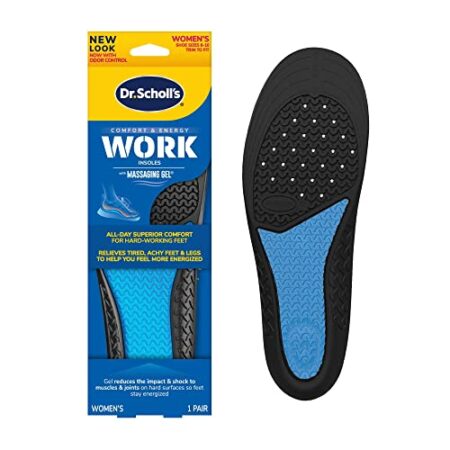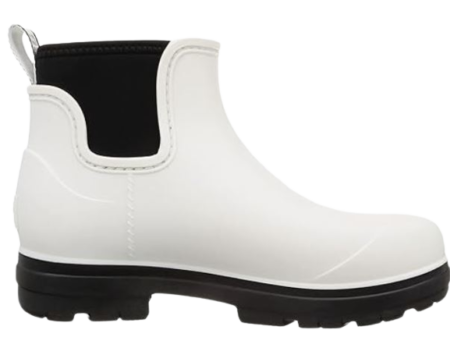As a nurse, you know that your job requires you to be on your feet for long hours. This can be tough on your feet, legs, and back, especially if you’re not wearing the right shoes. Choosing the right footwear is essential to your comfort and overall health, and it can even help you perform your job better. In this article, we’ll discuss what shoes to wear as a nurse and provide you with some tips to help you make the right choice.

Understanding the Importance of Proper Footwear for Nurses As a nurse, you spend a lot of time on your feet, which can lead to foot, leg, and back pain. Wearing the right shoes can help alleviate this pain and prevent future problems. Proper footwear can also improve your balance and stability, which is essential when you’re working in a fast-paced environment. Additionally, the right shoes can help prevent slips, trips, and falls, which are common accidents in healthcare settings.
Key Takeaways
- Proper footwear is essential for nurses to prevent foot, leg, and back pain, improve balance and stability, and prevent slips, trips, and falls.
- When choosing shoes, consider the type of work you do, your foot type, and any foot conditions you may have.
- Look for shoes with features such as good arch support, shock absorption, and slip-resistant soles. Some top recommended shoes for nurses include clogs, sneakers, and athletic shoes.
Understanding the Importance of Proper Footwear for Nurses

As a nurse, you spend a lot of time on your feet, often for 12-hour shifts. This can cause foot pain, heel pain, joint pain, and other discomforts. Wearing the right shoes can help alleviate some of these issues and make your workday more comfortable.
One of the most important features of proper footwear for nurses is arch support. This is because your feet bear the weight of your entire body and need proper support to prevent strain and injury. Cushioning and shock absorption are also important to reduce the impact on your feet and joints as you walk and stand.
It’s crucial to find shoes that fit properly. Shoes that are too tight or too loose can cause blisters, corns, and other foot problems. Look for shoes that are comfortable from the moment you put them on and don’t require a break-in period.
When it comes to choosing the right shoes, there are a few things to keep in mind. Look for shoes that are specifically designed for healthcare professionals, as they often have features that cater to the needs of nurses. Some popular brands include Dansko, Crocs, and Alegria.
In summary, proper footwear is essential for nurses and other healthcare professionals who spend long hours on their feet. Look for shoes with arch support, cushioning, and shock absorption, and make sure they fit well and are comfortable from the start. With the right shoes, you can help prevent foot pain and other discomforts and focus on providing the best care for your patients.
Types of Shoes Suitable for Nurses

As a nurse, you spend long hours on your feet, which can cause discomfort and fatigue. Wearing the right shoes can help alleviate some of these issues. Here are some types of shoes that are suitable for nurses:
Clogs
Clogs are a popular choice for nurses because they are comfortable and easy to slip on and off. The Dansko Professional Clogs are a top choice for many nurses due to their excellent arch support and slip-resistant sole. Another great option is the Oofos OOClog Clog, which has a soft, cushioned footbed that can help reduce foot fatigue.
Running Shoes
Running shoes are another excellent option for nurses, as they provide excellent support and comfort. The New Balance, Hoka One One, and Brooks Ghost 15 are some of the best running shoes for nurses. These shoes offer excellent arch support, cushioning, and stability.
Slip-On Shoes
Slip-on shoes are a convenient option for nurses who need to get in and out of their shoes quickly. The Figs New Balance 327 Unisex and Oofos Unisex Clogs are two great slip-on options for nurses. These shoes offer excellent support and comfort, making them a great choice for long shifts.
Overall, when choosing shoes for work, it’s essential to prioritize comfort and support. Consider trying on different types of shoes to find the perfect fit for you.
Special Considerations for Nurses with Foot Conditions

As a nurse, you are on your feet for long hours, and this can take a toll on your feet. If you have a foot condition, it is essential to take extra care when choosing your shoes. Here are some special considerations to keep in mind:
Plantar Fasciitis
If you have plantar fasciitis, you need shoes that provide excellent arch support and cushioning. Look for shoes that have the APMA Seal of Acceptance, which means they have been approved by the American Podiatric Medical Association. Orthotics can also help to provide additional support and cushioning.
High Arches
If you have high arches, you need shoes that provide excellent arch support and cushioning. Look for shoes that have a contoured footbed and a deep heel cup. Shoes with a rocker sole can also help to reduce pressure on your feet.
Wide Feet
If you have wide feet, you need shoes that provide enough room for your feet to spread out. Look for shoes that are labeled as “wide” or “extra wide.” Shoes with a round toe box can also help to provide more room for your toes.
Foot Deformities
If you have foot deformities, such as bunions or hammertoes, you need shoes that provide enough room for your toes and do not put pressure on the affected area. Look for shoes that have a wide toe box and are made from soft, flexible materials. Shoes with adjustable straps or laces can also help to provide a customized fit.
Remember to consult with a podiatrist if you have any foot conditions. They can recommend the best shoes and orthotics for your specific needs. By taking care of your feet, you can stay comfortable and focused on your work as a nurse.
Key Features to Look for in Nursing Shoes

As a nurse, you spend a lot of time on your feet, so it’s important to choose the right shoes to keep you comfortable and safe throughout your shift. Here are some key features to look for in nursing shoes:
Slip-Resistant
Slip-resistant shoes are a must-have for nurses, as they help prevent slips and falls on wet or slippery floors. Look for shoes with a rubber outsole that provides good traction on various surfaces.
Waterproof
As a nurse, you never know when you might encounter spills or other fluids on the floor. Waterproof shoes can help keep your feet dry and protected from any potential hazards.
Breathable
Nursing can be a physically demanding job, and your feet can get hot and sweaty. Look for shoes with breathable materials that allow air to circulate and keep your feet cool and dry.
Ankle Support
Nurses are often on their feet for long periods of time, which can put a lot of strain on their ankles. Look for shoes with good ankle support to help prevent injuries and provide added stability.
Ventilation
In addition to breathability, shoes with ventilation can help keep your feet cool and dry by allowing air to flow through the shoe.
Narrow Toe Box
A narrow toe box can help prevent your feet from sliding forward in your shoes, which can cause discomfort and even blisters.
Pronation
If you have issues with pronation or other foot problems, look for shoes that provide the right level of support and cushioning to help alleviate your symptoms.
Durable Rubber Outsole
A durable rubber outsole can help ensure that your shoes last through many shifts, even on rough or uneven terrain.
Thick Heel
A thick heel can help absorb shock and provide added support for your feet and ankles.
Extra Cushioning
Extra cushioning can help keep your feet comfortable and reduce fatigue, especially during long shifts.
Cushioning and Support
Look for shoes that provide a good balance of cushioning and support to help keep your feet healthy and pain-free.
By keeping these key features in mind, you can choose the best nursing shoes for your needs and stay comfortable and safe on the job.
Top Recommended Shoes for Nurses

As a nurse, you spend long hours on your feet, which can lead to foot pain, back pain, and other discomforts. Wearing the right shoes can make all the difference in your comfort and overall well-being. Here are some top recommended shoes for nurses that you should consider:
Dansko Clogs
Dansko clogs are a popular choice among nurses for their comfort and support. They have a slip-resistant sole, which is important for preventing slips and falls in a hospital setting. Additionally, they have a roomy toe box, which allows your toes to move freely and reduces pressure on your feet.
Clove Women’s Classic
Clove Women’s Classic shoes are designed specifically for healthcare professionals. They are slip-resistant, have a removable insole for customization, and are made with breathable materials to keep your feet cool and dry. They also have a sleek, stylish design that will complement any scrubs uniform.
Figs
Figs is a company that specializes in healthcare apparel, including shoes. Their shoes are designed with the needs of healthcare professionals in mind and are made with high-quality materials for durability and comfort. They have a slip-resistant sole, a cushioned footbed, and a moisture-wicking lining to keep your feet dry.
Hoka Bondi 8
Hoka Bondi 8 shoes are known for their cushioning and support. They have a thick sole that provides excellent shock absorption, which can reduce foot and back pain. They also have a roomy toe box and a breathable upper to keep your feet cool and comfortable.
On Cloud Shoes
On Cloud Shoes are a lightweight and comfortable option for nurses. They have a unique sole that provides excellent support and cushioning, while still being flexible enough to allow your feet to move naturally. They are also made with breathable materials to keep your feet cool and dry.
Overall, when choosing shoes for nursing, it’s important to look for shoes that provide support, comfort, and slip-resistance. Consider trying out a few different options to find the shoes that work best for you and your needs.
Frequently Asked Questions

What are some comfortable and supportive nursing shoe brands?
There are many nursing shoe brands that offer both comfort and support. Some popular options include Dansko, Alegria, and Crocs. These brands offer a variety of styles and colors to choose from, so you can find a pair that suits your personal preferences.
What features should I look for in nursing shoes?
When shopping for nursing shoes, it’s important to look for features that offer both comfort and support. Some key features to look for include a cushioned insole, arch support, slip-resistant soles, and a breathable upper. It’s also a good idea to choose shoes that are lightweight and easy to clean.
How can I choose the right size of nursing shoes?
It’s important to choose nursing shoes that fit properly in order to prevent discomfort and injury. When trying on shoes, make sure to wear the socks that you’ll be wearing while working. Walk around in the shoes to make sure they feel comfortable and supportive. If you’re unsure about your size, consider getting professionally measured at a shoe store.
What are the benefits of wearing nursing shoes?
Wearing nursing shoes can offer a variety of benefits, including improved comfort and support, reduced risk of slips and falls, and protection against spills and other hazards. Additionally, many nursing shoes are designed to be easy to clean, which can help prevent the spread of germs and bacteria.
Are there any specific colors or styles of nursing shoes that are recommended?
While there are no specific colors or styles of nursing shoes that are recommended, it’s important to choose a pair that meets your workplace’s dress code and your personal preferences. Many nursing shoes come in a variety of colors and styles, so you can find a pair that suits your needs.
How often should I replace my nursing shoes?
It’s important to replace your nursing shoes regularly in order to maintain their comfort and support. As a general rule, you should replace your nursing shoes every 6-12 months, or as soon as you notice signs of wear and tear. This will help ensure that your shoes continue to provide the support and protection you need while on the job.



